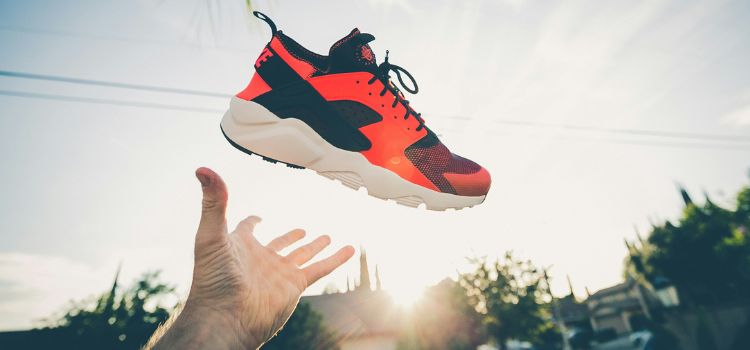As an Amazon Associate, I earn from qualifying purchases
Knee pain, a prevalent affliction transcending age and lifestyle, plagues many individuals worldwide. While there can be various causes for knee pain, one often overlooked factor is the type of shoes one wears. The shoes we choose to wear daily can significantly impact the health of our knees. This article aims to explore the types of shoes that are the worst culprits for exacerbating knee pain and offers alternatives for those seeking relief.
Common Causes of Knee Pain

Knee pain can arise from various underlying conditions, with some of the most common causes including arthritis, overpronation, and wearing improper footwear. Arthritis, characterized by inflammation and deterioration of the knee joint, can lead to persistent pain and stiffness. Overpronation, where the foot rolls excessively inward while walking or running, can also strain the knee joints and surrounding structures.
Additionally, wearing shoes with inadequate support or cushioning can exacerbate knee pain by altering gait mechanics and increasing pressure on the knees. Understanding these common causes of knee pain is essential for implementing appropriate preventive measures and seeking timely treatment to alleviate discomfort and maintain knee health.
Why Shoe Choice Matters
Shoe choice plays a significant role in determining the health and well-being of your knees. The shoes you wear impact the alignment, stability, and support of your feet, which directly affects the strain placed on your knees. Opting for shoes with inadequate cushioning or support can result in improper distribution of weight and increased pressure on the knees during daily activities like walking or standing.
Conversely, choosing shoes with proper cushioning, arch support, and stability can help maintain proper alignment and reduce the risk of knee pain and injury. By understanding why shoe choice matters, you can make informed decisions to protect your knees and promote overall musculoskeletal health.
Characteristics of Shoes to Avoid

1. High Heels
High heels are stylish but can be detrimental to knee health. They force the body into an unnatural position, tilting the pelvis forward and increasing pressure on the knees. This can lead to discomfort and exacerbate conditions like osteoarthritis. It’s essential to be mindful of the impact of high heels on your knees and consider alternatives that prioritize both style and comfort without compromising your joint health.
2. Flat Shoes
Flat shoes, while comfortable and convenient, can also contribute to knee pain. They often lack proper arch support and cushioning, leading to increased impact on the knees during activities like walking or running. Without adequate support, flat shoes can strain the knees and exacerbate existing discomfort. It’s important to choose footwear that offers both comfort and support to maintain healthy knee function and prevent pain.
3. Shoes With Poor Arch Support
Shoes with poor arch support can be problematic for knee health. Without proper support, these shoes can lead to overpronation, where the foot rolls excessively inward, causing misalignment of the knees. This can result in increased strain on the knee joints and contribute to pain and discomfort. It’s important to opt for footwear with adequate arch support to promote proper alignment and reduce the risk of knee problems.
Specific Shoe Types to Avoid

1. Flip-Flops
Flip-flops, although popular for their ease and comfort in warm weather, are not ideal for knee health. These shoes offer minimal support and cushioning, which can lead to increased stress on the knees. The lack of stability and shock absorption can exacerbate knee pain and discomfort, especially during prolonged walking or standing. It’s advisable to limit wearing flip-flops and opt for footwear with better support to protect your knee joints and overall musculoskeletal health.
2. High-Impact Athletic Shoes
High-impact athletic shoes, designed for activities like basketball or running, may seem supportive, but they can also contribute to knee pain. These shoes often provide excessive cushioning without proper stability, leading to instability and increased stress on the knees during intense physical activities. The lack of proper support can result in misalignment of the knees and potential injury. It’s essential to choose athletic shoes that offer a balance of cushioning and stability to protect your knees during high-impact workouts.
3. Ill-Fitting Shoes
Ill-fitting shoes can spell trouble for your knees. When shoes don’t fit properly, they can alter your gait mechanics, leading to improper alignment of the knees. This misalignment puts undue stress on the knee joints, which can result in pain and discomfort over time. Whether the shoes are too tight or too loose, it’s crucial to ensure a proper fit to maintain healthy knee function. Investing in shoes that fit well and provide adequate support can help prevent knee problems and promote overall comfort during daily activities.
Alternative Options for Knee-Friendly Footwear

For those struggling with knee pain, there are alternative options available that prioritize comfort and support:
1. Orthopedic Shoes
Orthopedic shoes are specially designed to provide optimal support and comfort for individuals with foot and knee issues. These shoes often feature features such as removable insoles, adjustable straps, and extra cushioning to accommodate various foot shapes and sizes. By offering enhanced support and stability, orthopedic shoes help alleviate pressure on the knees and promote proper alignment, reducing the risk of pain and discomfort. For those struggling with knee issues, investing in orthopedic shoes can make a significant difference in improving mobility and overall quality of life.
2. Stability Shoes
Stability shoes are footwear designed to address overpronation and promote proper alignment of the feet and knees. These shoes typically feature a supportive midsole and reinforced arch support to help control excessive inward rolling of the foot. By providing stability and support, stability shoes help distribute pressure evenly across the foot, reducing strain on the knees and minimizing the risk of injury. Whether for athletic activities or everyday wear, stability shoes can be beneficial for individuals seeking to maintain healthy knee function and prevent discomfort.
3. Cushioned Shoes
Cushioned shoes are footwear designed with ample padding and support to absorb shock and reduce impact on the knees during walking, running, or other activities. These shoes typically feature a soft midsole and extra cushioning in the heel and forefoot areas to provide a comfortable and supportive fit. By offering superior shock absorption, cushioned shoes help minimize stress on the knees, thereby reducing the risk of pain and discomfort, especially during high-impact activities. Whether for casual wear or athletic pursuits, opting for cushioned shoes can contribute to overall knee health and comfort.
Tips for Selecting Knee-Friendly Shoes

When shopping for shoes, consider the following tips to ensure you choose footwear that supports knee health:
- Prioritize comfort over style to ensure proper fit and support.
- Consider using orthotic inserts to provide additional cushioning and support.
- Seek professional advice from a podiatrist or orthopedic specialist to identify the best shoe options for your specific needs.
Conclusion
Choosing the right footwear is essential for maintaining healthy knees and preventing pain and discomfort. From high heels to flip-flops, certain types of shoes can exacerbate knee problems and increase the risk of injury. It’s crucial to opt for shoes that offer adequate support, cushioning, and stability to promote proper alignment and reduce strain on the knees.
Orthopedic shoes, stability shoes, and cushioned shoes are excellent options for individuals looking to prioritize knee health. These footwear choices provide enhanced support and comfort, helping to alleviate pressure on the knees and improve overall mobility.
By being mindful of the impact of footwear on knee health and selecting shoes that prioritize comfort and support, individuals can mitigate knee pain and maintain optimal joint function. Investing in the right shoes is an investment in your long-term knee health and overall well-being.
As an Amazon Associate, I earn from qualifying purchases

Leave a Reply